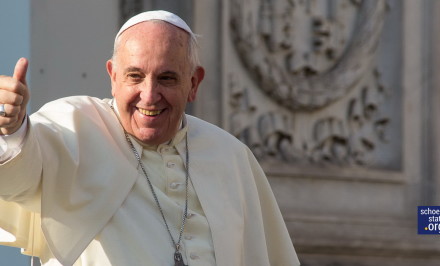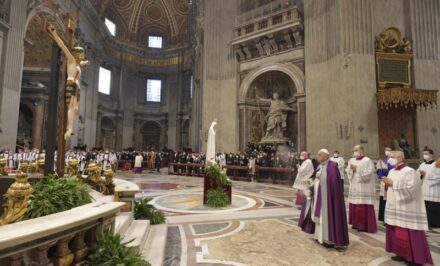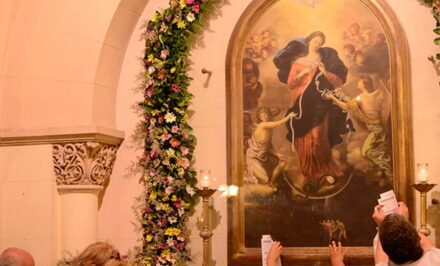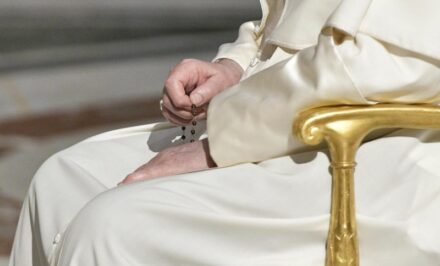
HOLY LAND, org. It was a surprising gesture, and how, for the entourage that accompanied Pope Francis from the headquarters of the presidency of the Palestinian National Authority to the Basilica of the Nativity in Bethlehem. When the jeep that he was travelling in passed the wall that separates the outskirts of Jordan from Israel, Francis ordered the vehicle to stop and he got out. The stop was unplanned and according to the journalists who accompanied the Pontiff, Francis remained in prayer for several minutes in front of the cement wall, very close to a watchtower occupied by an Israeli soldier. He prayed, touching the wall and pressing his forehead to it.

“It was a silent and prayerful gesture of revolt! A silence and a prayer more eloquent than a thousand speeches about this Wall that separates the sites of Christ’s birth and resurrection,” commented José M. Vida, a journalist for Spain’s Religión Digital.
“Enveloped in the mysticism of Jesus’ birth place, Pope Francis passed from words to actions in his efforts to revive the Middle East peace process. He decided to involve himself fully, and in an unexpected diplomatic move with global impact, he yesterday called on the presidents of Israel and Palestine to meet with him in the Vatican to “pray” for an end to the chronic conflict that mars the region.
Before the wall and before the walls of hate
 Francis revealed his offer of mediation during the mass over which he presided on one side of the Church of the Nativity, while the participants digested another historic gesture: on his way to Manger Square, he asked the popemobile to stop and he stepped down to pray in silence in front of the massive cement wall that separates Israel from Jordan,” wrote Martín Rodríguez Yebra, a correspondent for Argentinean daily, La Nación, which has been following Francis’ pilgrimage through the land of Christ.
Francis revealed his offer of mediation during the mass over which he presided on one side of the Church of the Nativity, while the participants digested another historic gesture: on his way to Manger Square, he asked the popemobile to stop and he stepped down to pray in silence in front of the massive cement wall that separates Israel from Jordan,” wrote Martín Rodríguez Yebra, a correspondent for Argentinean daily, La Nación, which has been following Francis’ pilgrimage through the land of Christ.
President Shimon Peres and President Mahmud Abbas announced almost immediately that they had accepted the invitation. They have already set a date: 6 June. In less than a week. A date that could become a historic milestone for peace. A date is already channelling the covenant in solidarity with Pope Francis: he wants to give himself completely for peace in the Middle East. Covenant solidarity is this: to make his desire our own and to give our grain of sand as contributions to the capital of grace, in daring gestures of peace and mercy, courage and solidarity with men who suffer injustice, lies and power games. Wherever it may be.
Readers of Schoenstatt.org and the presence of covenant solidarity
 About two weeks before Pope Francis’ historic pilgrimage to the Holy Land, Claudia Echenique from Buenos Aires and a collaborator of Schoenstatt.org, went on pilgrimage with her mother and group of Argentinean pilgrims to the land of Christ. She took with her about ten cards with the symbol of the covenant in solidarity that the Schoenstatt.org team sealed on 31 May 2013 with the aim of serving the life of the international Schoenstatt family and Pope Francis. Fr. Kentenich himself, after his return from exile called on his family to seal a covenant of love with the bishops, especially the Bishop of Rome. This includes Pope Francis. “I left the covenant solidarity heart in the Basilica of the Nativity, in the Grotto where the Star of Bethlehem is, in the Milk Grotto of the Virgin Mary and the chapel at Shepherds’ Fields (where there is a picture of the MTA),” writes Claudia. “In some places I was able to take photos. In other places, I had to leave it hidden, folded tightly and tucked into a corner, and sometimes in a hole in the wall. What is important is that not only all of the collaborators and readers (because it is for them that we give so many hours to translate, write, edit) of Schoenstatt.org were and are present in the holy places that Francis visited, where he spoke and acted as a pilgrim and prophet of peace, brotherhood and friendship for the children of the same one Father, but also so that our covenant in solidarity WITH HIM was waiting in each place that he touched during these days that may make history and certainly moved people beyond the moment and celebrations.
About two weeks before Pope Francis’ historic pilgrimage to the Holy Land, Claudia Echenique from Buenos Aires and a collaborator of Schoenstatt.org, went on pilgrimage with her mother and group of Argentinean pilgrims to the land of Christ. She took with her about ten cards with the symbol of the covenant in solidarity that the Schoenstatt.org team sealed on 31 May 2013 with the aim of serving the life of the international Schoenstatt family and Pope Francis. Fr. Kentenich himself, after his return from exile called on his family to seal a covenant of love with the bishops, especially the Bishop of Rome. This includes Pope Francis. “I left the covenant solidarity heart in the Basilica of the Nativity, in the Grotto where the Star of Bethlehem is, in the Milk Grotto of the Virgin Mary and the chapel at Shepherds’ Fields (where there is a picture of the MTA),” writes Claudia. “In some places I was able to take photos. In other places, I had to leave it hidden, folded tightly and tucked into a corner, and sometimes in a hole in the wall. What is important is that not only all of the collaborators and readers (because it is for them that we give so many hours to translate, write, edit) of Schoenstatt.org were and are present in the holy places that Francis visited, where he spoke and acted as a pilgrim and prophet of peace, brotherhood and friendship for the children of the same one Father, but also so that our covenant in solidarity WITH HIM was waiting in each place that he touched during these days that may make history and certainly moved people beyond the moment and celebrations.
The children as a symbol and criteria of the health of families and society

The Holy Father celebrated the Eucharist on Sunday morning at Manger Square in Bethlehem. Fr. Martin Emge of the Schoenstatt Institute of Diocesan Priests was present at the Mass. “It was a powerful experience, a great family moment,” commented Fr. Martin, the rector of the major seminary who is in the Holy Land with the seminarians of his diocese. Other Schoenstatt members, among them a group of Chilean couples accompanied by Fr. José María García and Fr. Egon Zillekens, the rector of Marienau in Schoenstatt, left on the same day for the Holy Land.
The atmosphere was different from the one experienced on Saturday in Amman, it was far more serious…Palestinian President Mahmud Abbas and groups of the faithful living on the Gaza Strip and Galilee (State of Israel) attended the Mass, together with many Asian workers.
The Child Jesus, born in Bethlehem, is the sign given by God to those who awaited salvation, and he remains forever the sign of God’s tenderness and presence in our world. The angel announces to the shepherds: “This will be a sign for you: you will find a child…”
Today too, children are a sign. They are a sign of hope, a sign of life, but also a “diagnostic” sign, a marker indicating the health of families, society and the entire world. Wherever children are accepted, loved, cared for and protected, the family is healthy, society is more healthy and the world is more human. Here we can think of the work carried out by the Ephpheta Paul VI institute for hearing and speech impaired Palestinian children: it is a very real sign of God’s goodness. It is a clear sign that society is healthier.
To us, the men and women of the twenty-first century, God today also says: “This will be a sign for you”, look to the child…
The Child of Bethlehem is frail, like all newborn children. He cannot speak and yet he is the Word made flesh who came to transform the hearts and lives of all men and women. This Child, like every other child, is vulnerable; he needs to be accepted and protected. Today too, children need to be welcomed and defended, from the moment of their conception.
Sadly, in this world, with all its highly developed technology, great numbers of children continue to live in inhuman situations, on the fringes of society, in the peripheries of great cities and in the countryside. All too many children continue to be exploited, maltreated, enslaved, prey to violence and illicit trafficking. Still too many children live in exile, as refugees, at times lost at sea, particularly in the waters of the Mediterranean. Today, in acknowledging this, we feel shame before God, before God who became a child.
And we have to ask ourselves: Who are we, as we stand before the Child Jesus? Who are we, standing as we stand before today’s children? Are we like Mary and Joseph, who welcomed Jesus and care for him with the love of a father and a mother? Or are we like Herod, who wanted to eliminate him? Are we like the shepherds, who went in haste to kneel before him in worship and offer him their humble gifts? Or are we indifferent? Are we perhaps people who use fine and pious words, yet exploit pictures of poor children in order to make money? Are we ready to be there for children, to “waste time” with them? Are we ready to listen to them, to care for them, to pray for them and with them? Or do we ignore them because we are too caught up in our own affairs?
“This will be a sign for us: you will find a child…”. Perhaps that little boy or girl is crying. He is crying because he is hungry, because she is cold, because he or she wants to be picked up and held in our arms… Today too, children are crying, they are crying a lot, and their crying challenges us. In a world which daily discards tons of food and medicine there are children, hungry and suffering from easily curable diseases, who cry out in vain. In an age which insists on the protection of minors, there is a flourishing trade in weapons which end up in the hands of child-soldiers, there is a ready market for goods produced by the slave labor of small children. Their cry is stifled: the cry of these children is stifled! They must fight, they must work, they cannot cry! But their mothers cry for them, as modern-day Rachels: they weep for their children, and they refuse to be consoled (cf. Mt 2:18).
“This will be a sign for you”: you will find a child. The Child Jesus, born in Bethlehem, every child who is born and grows up in every part of our world, is a diagnostic sign indicating the state of health of our families, our communities, our nation. Such a frank and honest diagnosis can lead us to a new kind of lifestyle where our relationships are no longer marked by conflict, oppression and consumerism, but fraternity, forgiveness and reconciliation, solidarity and love.
The pope finished his homily with a prayer to Mary – a prayer that can become part of the common prayers in all Schoenstatt communities:
Mary, Mother of Jesus,
you who accepted, teach us how to accept;
you who adored, teach us how to adore;
you who followed, teach us how to follow. Amen.
Never let the past determine your lives

“Now he is speaking in Spanish,” was the surprised comment of one of the Schoenstatt.org correspondents who was following the broadcast of Francis’ meeting with children at a refugee camp.
The Baby Jesus and the helpless children of today. Francis almost always unites the divine with the human. He did it again today, first visiting the grotto in Bethlehem where the Son of God was born, and then went to the Deheisheh refugee camp, especially to visit the children who live there. The flesh of the Baby Jesus today,” commented José M. Vidal from Spain’s Religión Digital.
“A greeting to all of you,” said the Pope, in his native Spanish, without reading from his notes. “I see that you have many things in your heart. May the good God give you everything you desire.” He listened attentively to the long and passionate testimonial of one of the children. “Thank you for your songs which were beautiful. You sing very well. I also want to thank you for what you said to me in the name of all. I am grateful for your gift, which is very meaningful. I read what was written on your posters; I understood those written in English, while Father here translated those written in Arabic. I understand what you are telling me, the message you are bringing me. Don’t ever allow the past to determine your lives. Always look to the future, work hard and make efforts to achieve what you want. But you must understand this: violence cannot be overcome by violence. Violence is overcome by peace! By peace, by working with dignity to help your homeland to move forward. My heartfelt thanks for your welcome! I ask God to bless you! And I ask you to pray for me! Thank you!
“Never allow the past determine your lives!” said Pope Francis. Claudia Echenique comments: “What a powerful sentence…for any person.”

Original: Spanish. Translation: Sarah-Leah Pimentel, Cape Town, South Africa













